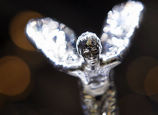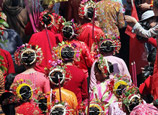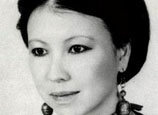
Three large Thangka — Tibetan scroll paintings — were placed in front of Yonghe Gate Hall, the first hall visitors see after entering the temple's main gate.
At 3 pm, the abbot appeared with his full entourage, all dressed in ritual costumes, from the east side of the hall. Behind the abbot, 12 lamas beat drums and cymbals as the "battle with the devil" took place.
Lamas escorted a skeletonlike figure symbolizing the devil onto the stage. The devil was later carried to the south gate of the temple and thrown into a fire, while Buddhist scriptures were recited.
Then they returned and distributed candies, said to guarantee good fortune, to the crowd.
Wang Shucai, 85, from Qingdao, Shandong province, visited the temple with her family.
Her 6-year-old granddaughter was excited to see the performance, saying she will share the experience with her friends back home.
Many foreigners were among the audience.
Christine Bellemer, a painter from France, watched the performance with her Chinese daughter-in-law.
"I am very curious about this ritual and the performance was really great," Bellemer said.
The temple sees its biggest influx of visitors on the first day of the Lunar New Year, receiving about 100,000 visitors.
But much fewer people came on the "devil dance" day, as the ceremony is not so well known, Su said.
The temple stepped up its security and hired extra guards during the ceremony. Thefts are rare, and the main job of the guards is to maintain order and prevent possible fires.
Vicky Ramos and Clara Bonet, both from Spain, met each other at the temple on Monday. They watched the entire ceremony, but had no idea what it was about, only knowing that it was a very special occasion.
Similar opinions were expressed during a rehearsal on Sunday afternoon. A young woman left about 10 minutes after the dance began, saying that she knew how to perform it after watching it for a while.
"Administrators at the temple have recognized this problem and plan to print brochures to explain this to visitors," said Su, the deputy director. "In 2014, people will receive free brochures and learn more about the origins of the dance."
Ye Qi, a lay Buddhist, has attended the ceremony for several years. Ye said Buddhism liberates her from worries and she is content to live a simple life on a frugal budget.

















 Flight attendants recruitment attracts beautiful young applicants
Flight attendants recruitment attracts beautiful young applicants


![]()
